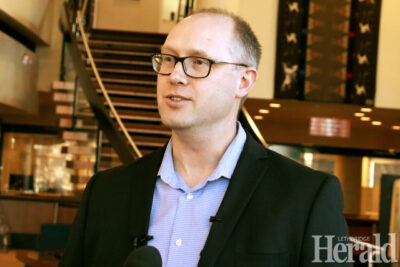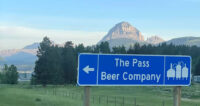City seeking feedback on water conservation
By Lethbridge Herald on January 26, 2024.
 Mark Svenson, Manager of Engineering and Environment, talks at City Hall about a survey on water conservation that the City is running.
Herald photo by Al Beeber
Mark Svenson, Manager of Engineering and Environment, talks at City Hall about a survey on water conservation that the City is running.
Herald photo by Al BeeberAl Beeber – LETHBRIDGE HERALD – abeeber@lethbridgeherald.com
The City of Lethbridge is seeking feedback from residents on local water conservation efforts.
A survey was launched Jan. 23 and runs until Feb. 7. It’s available at getinvolvedlethbridge.ca
The survey seeks information on what kind of measures residents take and what knowledge they have on water conservation measures.
It asks such questions if people are aware of potential water shortage concerns, if water conservation is a priority and what water-conscious fixtures people have in their homes such as low-flow showerheads, toilets and faucets.
People are asked to take the survey twice if they are not only a resident but a business operator as well.
“We put out a survey to the public looking for information, basically some feedback on residents and businesses – the way they currently conserve water, the ways they can maybe look to conserve water more efficiently. And what we can do as a community to increase our overall water conservation, stemming partially from the current situation in southern Alberta and across the province with lower water levels than normal that we’ve seen in a number of years,” said Mark Svenson, Manager of Engineering and Environment on Thursday.
“This will lead into the work that we’re doing to develop a water conservation plan,” said Svenson.
The survey also asks if people would participate should incentive programs become available, information which can help guide the City in preparing that plan and putting together some initiatives or some information that can help the public conserve water, said Svenson.
The City hasn’t narrowed down any initiatives. It first wants to get feedback to determine what initiatives the City could put out that might interest the public.
“Part of that will help the City determine what it can look for in terms of grants from the provincial and federal governments.
“There are many grants available for municipalities to help residents and businesses to conserve water,” said Svenson.
So feedback will help point the City in the right direction to present initiatives to the public.
“Many of those grants from the federal government and provincial government will allow municipalities to provide partial funding for those initiatives, whether it’s low flow showerheads, toilet replacements, things of that nature. There are grants out there for that but we don’t want to go after a grant at this point until we know there’s going to be some uptake,” added Svenson.
In 2016, the city prepared a water rationing action plan and part of the work being done now is updating it. It forms part of the overall water conservation plan, said Svenson. That plan, as a whole, looks at long-term change in behaviour, whether or not the City runs into water shortages.
“We want to change that behaviour so we aren’t wasting water unnecessarily.”
For emergency situations, the water rationing action plan comes into play where there are stages laid out in which the City looks to reduce water usage, depending on the stage by 10 to 40 per cent, he said.
Stage 1 was enacted last summer, as an example, in which the City asked residents and businesses to conserve water where they could to reduce demand by 10 per cent.
If water levels don’t improve this year, there is a chance the water rationing action plan could come back into play if it’s needed, Svenson added.
On April 4, the water conservation plan will be presented to the Assets and Infrastructure Standing Policy Committee of city council at its meeting. On that date, the plan will be presented for the first time in its entirety.
21-20





There are a lot of grants, heretofore, called free money, which is available to hand to the slackers who won’t take 10 minutes off their shower time, shower every second day instead of twice a day, reduce washing the dishwasher to evenings and shorter cycles, water your lawns occasionally, etc, etc, etc, Just how can we mingle in the market place? Wonder who is lined up to install low flow toilets and shower heads, with the free money????
Here we go again, stick it to the little guy residential user. Meanwhile large industry gets a volume discount price. The pipeline to McCain Foods past Coaldale is one example. Perhaps if industry had to pay more they would find efficiencies and conserve more.